Enhancing Your Chickens' Diet with Fruits and Vegetables
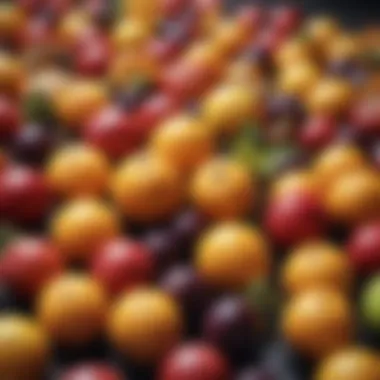
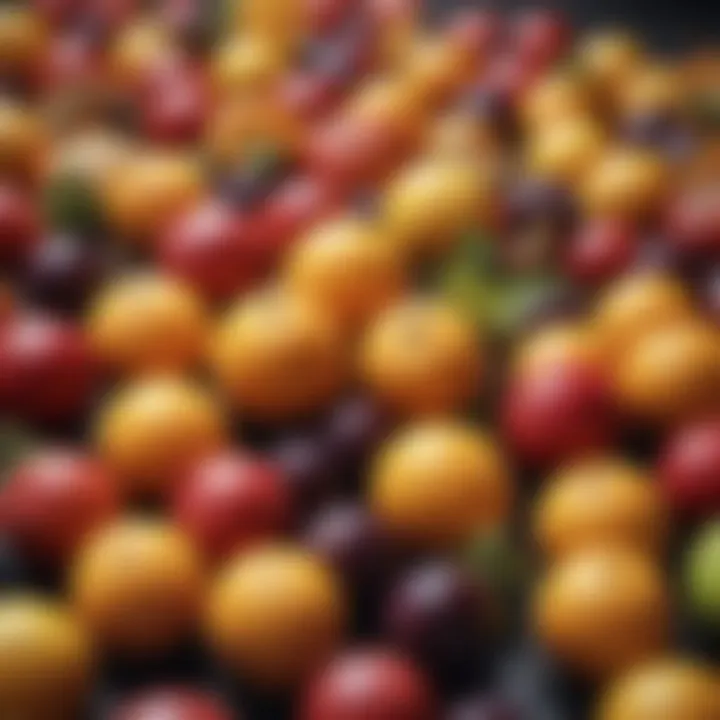
Intro
Chickens, like all animals, require a balanced diet to thrive. A variety of fruits and vegetables can greatly enhance their nourishment. This guide delves into the types of produce that are safe for chicken consumption, explores their nutritional benefits, and outlines any potential health risks involved. This knowledge empowers chicken owners to elevate their flock’s health and wellbeing through informed dietary choices.
As we discuss various fruits and vegetables, it is essential to recognize that not all produce is suitable for chickens. Some items may appear harmless but can cause digestive issues or toxicity. Therefore, understanding what to feed your chickens contributes significantly to their overall health.
This guide also emphasizes safe feeding practices, ensuring you incorporate these nourishing foods into your chickens' diets effectively. Whether you have backyard layers or broilers, knowing the right fruits and vegetables is fundamental for optimal chicken care.
Nutritional Benefits and Their Importance
The nutritional profiles of fruits and vegetables are rich and diverse. For chickens, these foods provide essential vitamins, minerals, and antioxidants. To illustrate, leafy greens like kale and spinach are excellent sources of vitamins A, C, and K. Vitamin deficiency can lead to health issues like poor egg production and weakened immune systems.
Fruits such as berries, bananas, and apples not only offer vitamins but also supply natural sugars and fiber. These nutrients support energy levels and promote good digestive health. Incorporating these foods regularly into your chickens' diet encourages better overall growth and productivity.
Potential Health Risks
While fruits and vegetables bring many benefits, certain foods can pose risks to chickens. For example, avocado contains a substance called persin, which can be toxic. Other foods, like raw potatoes or onion, can lead to digestive problems.
It is critical to research and understand each fruit and vegetable before adding it to your chickens’ feed. Keeping a comprehensive list of safe and unsafe foods will help prevent unintentional health risks.
Guidelines for Incorporation
Introducing fruits and vegetables into a chicken's diet should be done gradually. Start with small amounts and monitor their reactions. Observing for any signs of discomfort or digestive upset is crucial.
Additionally, washing fruits and vegetables before offering them helps remove pesticides and contaminants. Cut items into manageable pieces so that chickens can easily peck and consume them. Remember, moderation is key. Too much of any new food can lead to digestive disturbances.
In the following sections, we will dive into specific fruits and vegetables that are beneficial for chickens, discussing their individual nutritional profiles and safe preparation methods. This detailed exploration aims to provide chicken owners with the tools needed to create a varied and healthy diet for their flock.
Prelude to Chicken Nutrition
Understanding chicken nutrition is fundamental for anyone who keeps chickens, whether for eggs, meat, or companionship. Nutrition affects not only the health of the chicken but also the quality of the eggs and meat they produce. To support the well-being of chickens, a balanced diet is crucial.
Chickens are omnivores, which means they require a diverse range of nutrients available through their feed, treats, and supplements. Their diet can include grains, legumes, seeds, but also fruits and vegetables. The significance of incorporating fruits and vegetables into their diet cannot be overstated. These items are rich sources of vitamins, minerals, and antioxidants, which are essential for the immune system and overall health.
Fruits and vegetables add variety to a chicken's diet, contributing to better appetite and digestive health. Chickens that eat a balanced diet tend to be more active, healthier, and exhibit better feather quality.
However, not all foods are suitable for chickens, and understanding what to feed them requires attention and knowledge. Owners must be aware of the specific nutritional needs of their flock, including the right proportions of carbohydrates, proteins, fats, vitamins, and minerals. This guide will delve into the advantages of incorporating fruits and vegetables, as well as outline safe practices for feeding them.
"A healthy chicken is a productive chicken."
Furthermore, careful monitoring of a chicken's diet can lead to identifying any deficiencies or health issues early on. As we explore the role of fruits and vegetables in chicken diets, it becomes evident that thoughtful consideration on feeding practices can significantly enhance not only the life quality of chickens but also their output capabilities.
In summary, chicken nutrition is intricate and vital. A well-rounded diet fortified with fruits and vegetables plays a key role in fostering a resilient and productive flock.
The Role of Fruits and Vegetables in Chicken Diets
The inclusion of fruits and vegetables in the diets of chickens is paramount for their overall health and well-being. Chickens, much like humans, require a balanced diet that is rich in nutrients. While conventional feeds provide essential proteins and carbohydrates, adding fruits and vegetables offers a variety of vitamins, minerals, and dietary fiber that enhance overall health.
First and foremost, fruits and vegetables are excellent sources of vitamins A, C, and E, which play crucial roles in preventing diseases and promoting immunity. For instance, vitamin A is important for vision and reproductive health, while vitamin C aids in the healing of wounds and supports general health. Vitamin E works as an antioxidant, protecting body cells from damage.
Incorporating leafy greens and other vegetables can significantly improve chickens’ digestion. The dietary fiber present in these foods aids in healthy gut function. It helps with the absorption of nutrients, preventing issues like constipation.
Moreover, the hydration provided by certain fruits and vegetables, such as watermelon and cucumber, is invaluable, especially in hot weather. These foods help keep chickens cool and prevent dehydration, which can lead to stress and health problems.
"A diverse diet not only keeps chickens healthy but also aids in the production of high-quality eggs."
When introducing fruits and vegetables into a chicken's diet, it is important to do so gradually. This not only allows for adjustment in digestive processes, but also helps monitor how individual birds react to new foods. Observing their behavior and health after dietary changes is essential for ensuring that the introduction of new produce is beneficial and not harmful.
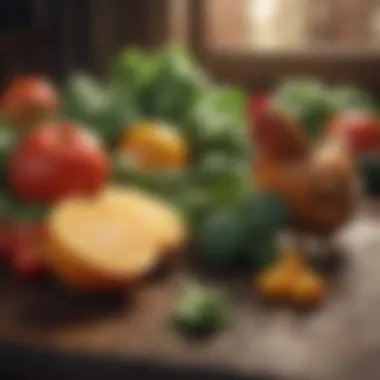

Another significant consideration is the variety of foods. A blend of colors and types ensures a wide range of nutrients. For example, orange-hued foods like carrots offer beta-carotene, while dark leafy greens provide a host of essential vitamins.
In summary, the role of fruits and vegetables in chicken diets cannot be overstated. They provide critical nutrients that support immune system function, digestive health, and overall vitality. Chicken owners should embrace the integration of these foods to enhance the well-being of their flocks, ensuring that the diets remain diverse and nutritious.
Common Fruits Safe for Chickens
Incorporating fruits into a chicken's diet can provide notable nutritional benefits. Fruits are generally high in vitamins, minerals, and antioxidants, which support a chicken's overall health. Understanding which fruits are safe is vital for chicken owners. Not all fruits are suitable; some can be toxic. However, many fruits can enhance a chicken's diet, making it more varied and nutritious.
Apples
Apples are a popular choice among many chicken owners. They are easily accessible and nutrient-dense. Apples provide vitamin C, which helps strengthen the immune system. They also contain fiber, aiding in digestion. It is important to remove the seeds before feeding apples to chickens, as the seeds contain cyanogenic compounds that can be harmful in large amounts. Offer apples sliced or diced to encourage consumption.
Berries
Berries, such as strawberries, blueberries, and raspberries, are rich in vitamins and antioxidants. These fruits can also be lower in sugar compared to other fruits, which is beneficial for regulating chickens' energy levels. Berries can be fed whole or mashed for easier eating. Regularly offering berries can support a healthy diet and promote vibrant plumage due to their antioxidant properties.
Bananas
Bananas are high in potassium and provide energy, which is excellent for active chickens. They have a soft texture that is easy for chickens to eat. However, they are also higher in sugar than other fruits, so moderation is key. Small pieces can be fed as a treat, preventing excessive calorie intake which isn't ideal for maintaining proper weight in chickens.
Grapes
Grapes are another safe fruit for chickens. They are hydrating and rich in vitamins C and K. When feeding grapes, they should be halved to prevent choking hazards. Grapes are an enjoyable treat for chickens, and their sweet flavor may encourage birds to be more playful and active. Always ensure they are washed before feeding to remove pesticides.
Melons
Melons, including watermelon and cantaloupe, can be refreshing treats for chickens, especially during warmer months. Melons are composed mainly of water, keeping the hens hydrated effectively. They provide vitamins A and C, enhancing skin health and immune function. Offer melons in slices or cubes, and consider leaving some rinds for chickens to peck at. Avoid giving seeds to chickens as they can cause digestive discomfort.
Vegetables Beneficial for Chickens
Including vegetables in a chicken's diet is important for their overall health and wellness. Vegetables provide essential vitamins and minerals that support various bodily functions. They are low in calories, which helps maintain a healthy weight for chickens. A diet rich in vegetables improves the immune system and can enhance egg production. Moreover, different vegetables offer varying nutritional profiles, making it crucial to incorporate a variety.
When choosing vegetables for chickens, consider those that are safe and beneficial. Each type of vegetable carries unique health benefits. Chickens can enjoy a wide range of textures and flavors, which can keep their meals interesting and desirable.
Carrots
Carrots are a fantastic addition to a chicken's diet. They are high in beta-carotene, which converts to vitamin A in the body. This vitamin is crucial for good vision and maintaining healthy skin. Chickens can eat carrots raw, cut into small pieces, or grated. The crunchiness of carrots also helps chickens with beak health, allowing them to naturally wear down their beaks as they peck.
Lettuce
Lettuce is a hydrating vegetable that chickens will enjoy eating. It is low in calories, which means it can be fed in larger quantities without overfeeding. Leafy greens, particularly darker varieties, provide fiber, vitamins A, C, and K. However, it is important to avoid iceberg lettuce as it lacks substantial nutrients. Always wash lettuce thoroughly before feeding to remove any pesticides or contaminants.
Pumpkin
Pumpkin is a nutrient-dense vegetable that offers numerous benefits. It is rich in vitamins such as A, C, and E, as well as the B vitamins. Additionally, pumpkin contains essential minerals like potassium and magnesium. Chickens will happily eat both the flesh and the seeds. The fibers in pumpkin can also aid digestion.
Squash
Squash is another great option for chickens. Varieties such as zucchini and butternut squash can be served raw or cooked. Squash is high in vitamin A and contains antioxidants that help boost the immune system. Simply chopping it into manageable pieces makes it easy for chickens to consume. Note that the skin is also good to feed.
Spinach
Spinach is packed with nutrients, including iron, calcium, and vitamins A and K. It is excellent for promoting strong bones and healthy muscles in chickens. Spinach can be fed raw or steamed. However, due to its high oxalic acid content, it is wise to offer it in moderation to prevent potential health issues. Chickens tend to love the taste, which makes it a popular choice in many flocks.
Important Note: Always ensure to introduce any new vegetables gradually to monitor how chickens respond, and avoid any spoiled or moldy produce.
Fruits and Vegetables to Avoid
The choice of fruits and vegetables for chickens must be done carefully. While many fruits and vegetables provide essential nutrients, others can be harmful. Knowing which items to avoid is crucial to maintain the health of your flock. This section discusses specific fruits and vegetables that should not be included in a chicken's diet, highlighting potential health risks and their implications on chicken well-being.
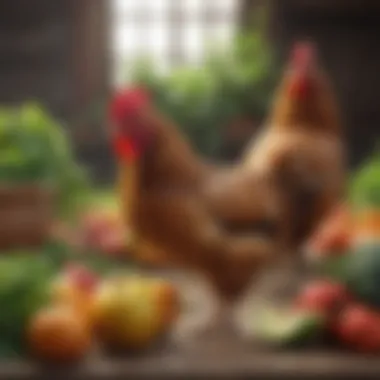
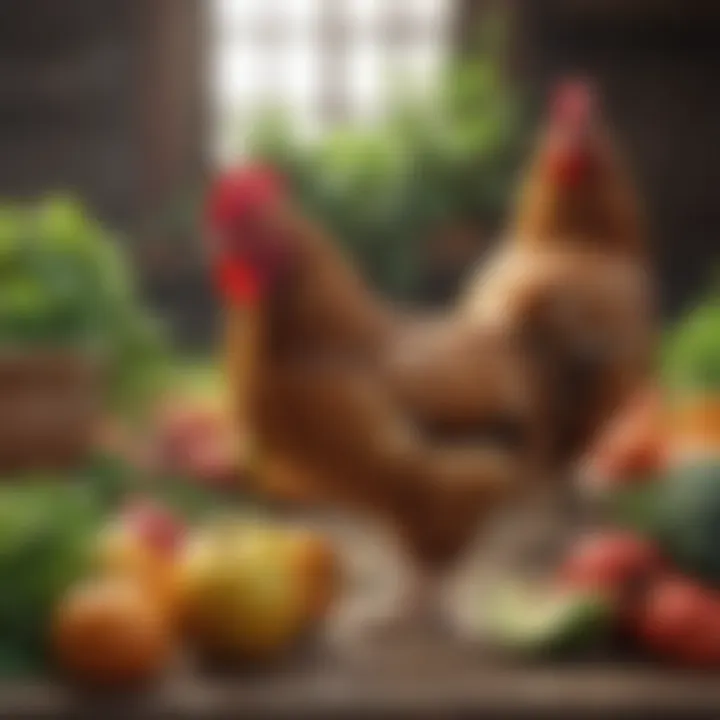
Avocado
Avocado is a fruit that poses significant risks for chickens. It contains a toxin called persin. This compound can lead to respiratory distress, congestion, and even death in birds. Importantly, all parts of the avocado plant—such as the flesh, stones, and leaves—are harmful. Given its dangerous nature, it is best to eliminate avocado from your chickens' diet completely.
Key Points:
- Persin is toxic to chickens.
- All parts of the avocado plant are dangerous.
- Symptoms of avocados poisoning include difficulty breathing and lethargy.
Onions
Onions are another food that chicken keepers should avoid. They contain compounds known as thiosulfates, which can damage chickens' red blood cells. This damage results in a condition known as hemolytic anemia. Symptoms include weakness, lethargy, and potential organ failure in severe cases. Careful monitoring is necessary as the toxic effects can accumulate over time. Thus, it’s best to keep onions, both raw and cooked, away from your flock.
Key Points:
- Thiosulfates can harm red blood cells.
- Can cause hemolytic anemia in chickens.
- Symptoms can take time to show, so prevention is key.
Potatoes
Potatoes can also be problematic when fed to chickens. The green parts of a potato, such as the leaves and any green skin, contain solanine, which is toxic to chickens. Even consuming small amounts can cause gastrointestinal disturbances and can be lethal in larger quantities. If potatoes are to be offered, they must be cooked and free from green areas. However, it is advisable to avoid potatoes entirely to mitigate the risk of toxicity.
Key Points:
- Solanine is found in green parts of potatoes.
- Can lead to gastrointestinal issues.
- Cooking does reduce some risk, but avoidance is safer.
Avoiding these fruits and vegetables is not just about comfort; it is about ensuring a healthy and thriving flock. Ensuring your chickens do not eat harmful foods will contribute to their longevity and overall well-being.
How to Prepare Fruits and Vegetables for Chickens
Proper preparation of fruits and vegetables is essential for chicken owners. This stage significantly influences the health of your flock. Chickens, by nature, are curious and will often peck at various foods you offer. However, feeding them incorrectly prepared items can lead to unhygienic conditions or even health issues.
When fruits and vegetables are clean and cut well, they are more appetizing to chickens. Moreover, it reduces the risk of choking and helps in better digestion. Different types of produce require different approaches in terms of preparation. Understanding these methods will create a balanced diet for your chickens and encourage them to consume a variety of healthy foods.
Washing and Cutting
Before serving fruits and vegetables to your chickens, it is crucial to wash them thoroughly. This step removes pesticides, dirt, and bacteria. Many commercial vegetables and fruits are treated with chemicals that can be harmful to chickens. By washing produce under running water, you can minimize any risks associated with residues.
After washing, cutting fruits and vegetables into appropriate sizes is important. Chickens have small beaks, and large pieces might not be feasible for them to eat. For example, a whole apple can be intimidating. It's better to slice it into quarters or smaller. Similarly, vegetables like carrots should be cut into manageable sticks or rounds. This makes it easier for the chickens to eat and ensures that they consume an adequate amount.
Additionally, consider removing any toxic seeds or pits, such as those found in stone fruits like cherries or peaches. Always ensure the skin is intact if it is safe for chickens, as it often contains beneficial nutrients.
Feeding Techniques
How you feed fruits and vegetables to chickens can affect how they accept and digest the food. Simply placing produce on the ground may lead to waste. Chickens are more inclined to eat when food is presented to them nicely. Hanging vegetables like leafy greens can mimic their natural foraging behavior and keep them active.
You can use various methods to provide these nutrients:
- Scatter Feeding: Distributing small pieces across the ground encourages natural pecking behavior and keeps them engaged.
- Feeding in Bowls: Utilizing bowls or containers can limit waste, sparing the food from becoming dirty or trampled.
- Using Treat Dispensers: These can be fun and promote physical activity. Chickens will have to work a little to obtain their food.
It is important to observe your chickens’ reactions to different types of foods. Every flock is unique. Therefore, determining their preferences can enhance their dietary experience. Adjustments should be made based on their response to different feeding methods. Monitoring their habits and ensuring that they seem satisfied with their meals can also help in maintaining their overall health.
Proper feeding methods can boost the chickens’ dietary intake and prevent unnecessary waste.
Signs of Improper Diet in Chickens
Maintaining a balanced diet for chickens is crucial for their overall health and wellbeing. An improper diet can lead to various health issues that may go unnoticed initially. Therefore, recognizing the signs of an inadequate or unbalanced diet is essential for any chicken owner.
Chickens are sensitive creatures, and their physical condition often reflects their nutrition. Here are some common indicators that your chickens might not be receiving the proper nutrients:
- Feather Quality: Healthy chickens have shiny, smooth feathers. If feathers appear dull, brittle, or are falling out, it may be a sign that they are not getting the right vitamins and minerals.
- Weight Changes: Significant weight loss or gain in chickens is alarming. Weight loss can indicate deficiencies in energy sources, while excessive weight may result from poor carbohydrate intake.
- Egg Production: A usual laying cycle can be disrupted by improper nutrition. If hens suddenly decrease their egg production or stop laying altogether, a dietary imbalance could be the culprit.


"A chicken's diet greatly affects its productivity and health. Monitor changes closely."
- Behavioral Changes: Lethargy or a lack of interest in eating can signal nutrient deficiencies. Active chickens should show curiosity and energy. If chickens seem listless or isolated, it may indicate a need for dietary adjustments.
- Digestive Issues: Chickens can exhibit signs of digestive discomfort, such as diarrhea or undue bloating. Such symptoms often point to poor quality feed or unsuitable dietary choices.
- Beak and Comb Health: A healthy beak and comb should be firm and brightly colored. Pale or shriveled combs can indicate an improper diet lacking in essential nutrients.
To keep your birds healthy, consider the variety and quality of their food. By cross-referencing these signs with your chickens' diet, you can gain insights into any requisite changes to their feeding regimen. Regular monitoring of your flock's health is vital; it provides an opportunity to make adjustments before significant health issues arise.
Balancing Chickens' Diets with Greens
Incorporating greens into the diets of chickens is critical for their overall health and well-being. Chickens, like many other animals, thrive on a balanced diet that includes a variety of nutrients. While grains and mash provide the core dietary components, greens supplement this diet, offering essential vitamins and minerals that promote optimal growth and productivity.
Importance of Greens
Greens can enhance the nutritional profile of a chicken's diet significantly. They are rich in vitamins A, C, and K, as well as various minerals. These nutrients support various bodily functions, including immune function and bone health. Furthermore, a diet that includes greens can improve egg production and quality, making them beneficial not only for the chickens’ health but also for the productivity of egg-laying hens.
Specific Benefits of Greens
- Improved Digestive Health: Greens provide fiber that aids in digestion. This can help prevent issues such as constipation and promote a healthy gut.
- Enhanced Immune Function: Nutrients found in leafy greens strengthen the immune system. This is crucial for preventing diseases that can affect chickens, especially in crowded conditions.
- Weight Management: Offering greens can encourage natural foraging behavior. This helps maintain a healthy weight, which is important for their overall health and egg-laying consistency.
- Natural Behavior Stimulation: Chickens are naturally inclined to explore and peck at their food. Providing greens encourages this behavior, reducing boredom and potential stress that can arise from confinement.
Considerations for Supplementing with Greens
While greens are beneficial, it is essential to introduce them in moderation. Overfeeding greens can lead to nutritional imbalances, as they should not replace the primary feed. A careful balance helps ensure that chickens receive all necessary nutrients without becoming reliant on one food source.
Greens should be fresh and clean to avoid contamination. It is advisable to wash any produce thoroughly before feeding it to chickens. Some great options for greens include kale, collard greens, and dandelion greens. However, feed these items in conjunction with grains and commercial feeds designed for poultry.
"Variety is key to a balanced diet. Greens should complement rather than substitute other dietary components."
The idea is to create a varied diet that keeps chickens healthy and active. A good practice is to rotate the types of greens offered, allowing chickens to experience different tastes and textures, which can enhance their eating experience and nutritional intake.
In summary, balancing chickens' diets with greens is important for their overall health. The blend of grains, commercial feeds, and fresh greens can contribute significantly to a nutritious, engaging, and enjoyable diet for your chickens.
Monitoring Chicken Health
In the realm of chicken husbandry, the concept of monitoring chicken health cannot be overstated. Maintaining the wellness of your flock is paramount. A healthy chicken is productive, both in egg-laying and overall behavior. Therefore, regular monitoring leads to early detection of issues, which can prevent larger problems down the road.
Regular Health Check-ups
Regular health check-ups are essential for ensuring the well-being of chickens. These check-ups allow owners to spot signs of illness or distress early. Start with a visual inspection of the flock. Look for any changes in behavior or appearance. Is a chicken isolating itself from the group? This can indicate health issues.
Physical examinations should include checking for weight fluctuations, feather quality, and overall mobility. Additionally, fecal assessments are revealing. Healthy droppings should be firm and well-formed. Loose or discolored droppings often signal diet issues or health problems.
Routine health assessments can establish a baseline for each bird. Keeping records of health check-ups is also beneficial. This can track changes over time and identify patterns that may arise.
Dietary Adjustments
Dietary adjustments play a significant role in maintaining chicken health. Chickens require a balanced diet for optimal health. When signs of distress arise, it may be time to reassess what you feed them. Incorporating various fruits and vegetables can not only enrich their diet but also improve their overall health. However, it is important to introduce new items gradually.
Consider environmental factors as well, like the season. In hotter weather, chickens may prefer lighter fare, such as cucumbers or watery fruits. Conversely, in colder weather, hearty options like squash can offer the necessary warmth and nutrients.
Making notes of any changes in their eating habits can help identify preferences or intolerances.
"Regular monitoring of chicken health should always include a focus on diet, as it directly influences their well-being."
Closure and Recommendations
However, it is vital to provide these treats in moderation. While fruits and vegetables are beneficial, they should complement a balanced diet composed of grain-based feed. For instance, apples and carrots can be delightful additions, but relying solely on them may lead to nutritional deficiencies.
Recommendations:
- Introduce new fruits and vegetables gradually to monitor any adverse reactions.
- Ensure all produce is clean and properly prepared to avoid contamination.
- Avoid foods that are toxic to chickens, such as avocado, onions, and potatoes, as they can cause serious health issues.
- Regularly check and adjust feed based on the chickens’ health signs and behaviors.
By prioritizing a varied and balanced diet, chicken owners can support the longevity and productivity of their flocks. Tailoring diets to individual needs allows for optimal health, making it essential to stay informed about the best practices in chicken nutrition.
"A well-fed chicken is a happy chicken, and happy chickens produce the best eggs."
In summary, a thoughtful approach to feeding chickens fruits and vegetables can foster a thriving flock. Emphasizing quality produce with appropriate feeding practices can make a significant difference in the life and health of these birds.







